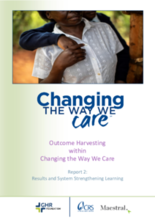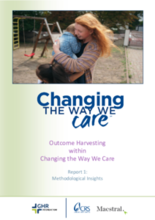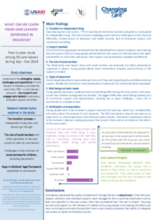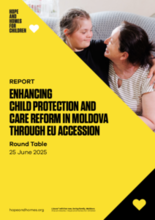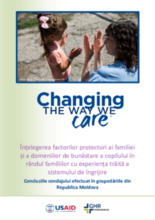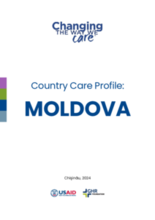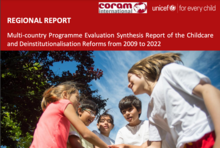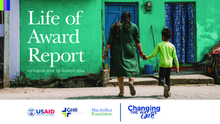This country page features an interactive, icon-based data dashboard providing a national-level overview of the status of children’s care and care reform efforts (a “Country Care Snapshot”), along with a list of resources and organizations in the country.
demographic_data
childrens_living_arrangement
children_living_without_bio
adoption
social_work_force
key_stakeholders
Key Stakeholders
Add New DataOther Relevant Reforms
Add New Datadrivers_of_institutionalisation
Drivers of Institutionaliziation
Add New Datakey_research_and_information
Key Data Sources
Add New DataDevelopment of Integrated Social Care Services for Vulnerable Families and Children at Risk in Moldova
Care Reform Workshop Report
Acknowledgements
Data for this country care snapshot was contributed by partners at Lumos and Changing the Way We Care.
Displaying 11 - 20 of 216
At the close of the Changing the Way We Care (CTWWC) The Changing the Way We Care (CTWWC) initiative launched in 2018 with the aim to reform child care systems by promoting safe, nurturing family-based care over institutional ca
At the close of the Changing the Way We Care (CTWWC) The Changing the Way We Care (CTWWC) initiative launched in 2018 with the aim to reform child care systems by promoting safe, nurturing family-based care over institutional ca
This one-page English-language synopsis of the full report in Romanian titled, “Ce putem învăța de la tinerii cu experiență trăită în sistemul de îngrijire din Republica Moldova?” (What can we learn from young people with lived experience in Moldova's care system?), offers a compelling peer-to-peer perspective from 56 young people who transitioned out of Moldova’s care system.
A round table in Brussels, co-hosted by Hope and Homes for Children and European Parliament Vice President Victor Negrescu, explored child protection and care reform in Moldova within the context of EU accession. The report highlights progress made, ongoing challenges, and shared commitments to ensuring every child in Moldova grows up in a safe and caring family.
Acest raport prezintă rezultatele unui studiu participativ realizat de rețeaua Youth & Experience (Y&E), fondată de tineri cu experiență trăită în sistemul de îngrijire din Republica Moldova, realizat în perioada septembrie - decembrie 2024 cu participarea a 56 de tineri.
Un aspect esențial al misiunii CTWWC, constă în acumularea și prezentarea evidențelor ce vizează reforma sistemului de îngrijire, în special aspectele referitoare la tranziția copiilor din îngrijirea rezidențială și reintegrarea în propriile familii sau plasamentul în îngrijire alternativă de tip familial și prevenirea separării sau reseparării copiilor de familie. Astfel, pentru acumularea informațiilor concludente, CTWWC a efectuat un sondaj al gospodăriilor în rândul familiilor care au beneficiat de suport în cadrul inițiativei, cu scopul de a informa autorităților publice și practicienii care activează în acest domeniu.
This country care profile provides an overview of key lessons learned in the children’s care reform process in Moldova, including successes, challenges and areas for progress, and gaps in learning and best practice.
This report presents the main findings, conclusions, and recommendations of an evaluation of the child care and deinstitutionalisation reforms in seven countries in the Europe and Central Asia Region (Bulgaria, Georgia, Moldova, Montenegro, Northern Macedonia, Serbia and Tajikistan). The report offers valuable insights into the effectiveness of child protection systems and the transition from institutional care to family- and community-based alternatives. It highlights key achievements, lessons learned, and best practices, while also addressing the areas where further improvements are needed to ensure that every child can grow up in a nurturing, safe, and supportive environment.
The Changing the Way We Care℠ (CTWWC) Life of the Award Report highlights the initiative’s global efforts to promote safe, nurturing family care for children. Since 2018, CTWWC has been driving care reform in countries like Guatemala, Kenya, and Moldova, while supporting smaller projects in Haiti and India.
Bune Practici de Asistență Parentală Profesionistă pentru Copiii cu Nevoi Complexe: Rezultatele analizei preliminare a literaturii de specialitate pentru pregătirea proiectului pilot privind asistența parentală profesionistă specializată în Republica Moldova rezumă cele mai bune practici internaționale în domeniul asistenței parentale profesioniste specializate, și oferă perspective și recomandări esențiale pentru dezvoltarea și extinderea asistenței parentale profesioniste specializate în Republica Moldova.

